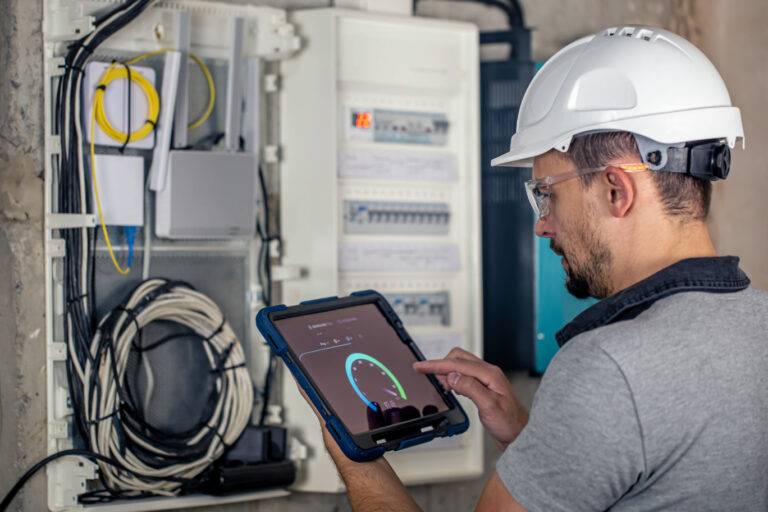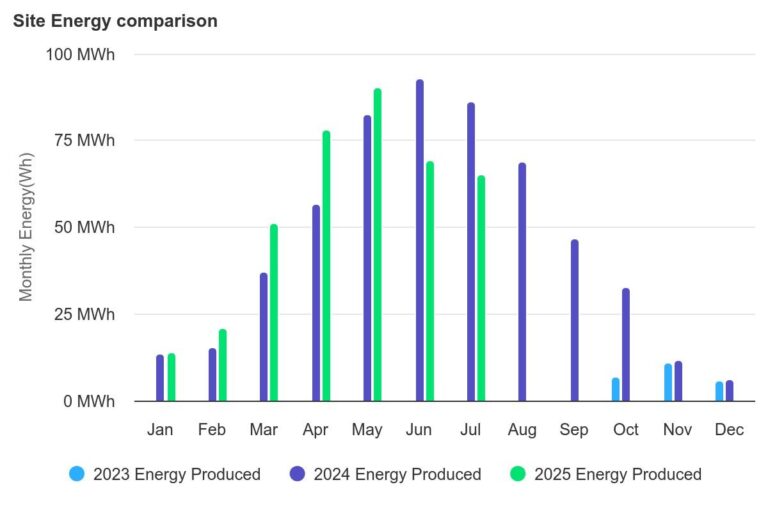Smart Energy Solutions for Businesses
Smart energy solutions for businesses are no longer a luxury. They are a strategic necessity. In today’s competitive business world, managing energy efficiency is key to cutting costs, improving sustainability, and staying ahead. The latest developments, including smart grids, advanced metering, on-site storage, and intelligent energy management, allow businesses to operate more efficiently, lower costs, and meet carbon targets with confidence.
Smart grids are advanced networks that equip businesses to be able to manage electricity demand more effectively. By incorporating renewable energy sources like solar and wind, smart grids refine power distribution, reliability, and reduce energy waste, ensuring smooth operations for commercial enterprises.
A microgrid is a localised electrical network that can operate independently or in coordination with a larger utility grid. It generates and distributes electricity for a specific area, like a campus, business park, or community.
Key Aspects of Smart Energy Solutions for Businesses

Localised Energy System:
Microgrids focus on generating and distributing electricity within a specific area instead of depending solely on a large, centralised grid.
Distributed Energy Resources (DER):
They can use various energy sources, including renewable options such as solar panels and wind turbines, as well as energy storage systems like batteries alongside traditional generators.
Independent or Grid-Connected:
Microgrids can function independently or in parallel with the larger grid, drawing power when necessary and sending excess energy back.
Benefits Of Smart Energy Management
Improved Reliability:
During grid outages, microgrids can continue to provide power to critical loads, ensuring continuous service.
Increased Efficiency:
Local generation and distribution reduce energy losses from long-distance transmission.
Increased Sustainability:
Microgrids include renewable energy sources, lowering dependence on fossil fuels.
Flexibility with Expandability:
Can be customised to meet specific needs and resized as required.
What our clients say
Examples of Applications:
✅ University campuses
✅ Hospital complexes
✅ Military bases
✅ Industrial sites
✅ Residential communities
Smart Meters
Smart meters allow businesses to access real-time data on energy use, permitting precise monitoring and effective energy management. By examining usage patterns, companies can revise their energy consumption, lower utility bills, and improve demand forecasting.
In commercial settings, smart meters provide detailed energy usage information, helping businesses identify inefficiencies, cut costs, and reduce their carbon footprint. They also simplify billing and reduce the need for manual meter readings.

Benefits for Businesses:
Accurate Billing and Reduced Costs:
Automatically sending meter readings to energy suppliers is a key advantage of smart meters, ensuring accurate bills and eliminating the need for manual readings or estimates.
Upgraded Energy Efficiency:
Businesses can use smart meter data to identify energy waste and take targeted actions to improve efficiency, ultimately lowering energy use and costs.
Time Savings:
Automatic meter readings save businesses time and resources by removing the need for manual collection and submission.
Environmental Benefits:
Smart meters offer a clearer view of energy usage, helping to balance supply and demand whilst positively reducing reliance on fossil fuel plants by supporting renewable energy use.
Support for Renewable Energy Integration:
Incorporation of renewable energy sources into the grid is made easier by providing real-time consumption data, allowing for better management of generation and distribution.
Time-of-Use Tariffs:
Smart meters help businesses take advantage of time-of-use tariffs, which provide lower energy prices during off-peak hours, leading to further cost savings.
Easier Monitoring of Energy Usage:
Apps and websites that receive information from smart meters let businesses easily track energy use, even when their premises are vacant, which is especially useful for commercial landlords.
Preventing Disputes:
Smart meters help avoid issues at the end of a lease by providing precise and automatic readings, reducing the chance of disputes.
Data for Prospective Tenants:
Commercial Landlords can share smart meter data with prospective tenants to give them accurate information about the property's energy costs.
How Smart Meters Work:
Smart meters are electronic devices that automatically transmit energy consumption data to suppliers using wireless communication.
This information is usually sent at regular intervals, usually every thirty minutes, to give a detailed view of energy usage.
Smart Meter Rollout:
The UK government plans to have smart meters installed in all homes and businesses by 2025.
The rollout is ongoing, with energy suppliers installing smart meters for their customers.
Getting a Smart Meter:
Businesses can request a smart meter from their energy supplier.
The installation generally involves a technician visiting to set up the meter.
Possible Issues:
In rare cases, network problems might stop smart meters from sending data.
Some businesses may face challenges with older smart meters (SMETS1) that do not support switching suppliers.
Some installed meters may not work correctly or have technical problems preventing data transmission.
Refusing a Smart Meter:
Businesses are not required to accept a smart meter if they do not want one.
If a supplier insists on installation, companies can contact the Citizens Advice consumer helpline for assistance.
Energy Storage Systems
Energy storage solutions, like high-capacity battery systems, allow businesses to store excess renewable energy for later use. This is especially beneficial for industries with high energy demands. It helps reduce peak-time electricity costs, ensures reliable power, and fortifies grid stability.
Businesses can take advantage of energy storage systems by charging batteries during off-peak hours when electricity prices are lower. They can then sell the stored energy back to the grid during peak demand when prices are higher. This approach, known as energy arbitrage, creates an additional revenue stream while lowering energy costs. By using time-of-use tariffs, businesses can amplify savings and improve overall energy efficiency, reducing their reliance on expensive grid electricity during peak times.
What is Energy Arbitrage?
Energy arbitrage involves buying electricity during off-peak hours (when prices are low) and selling it back to the grid during peak times (when prices are high) to magnify profits.
How is it possible in the UK?
Due to the UK having a deregulated electricity market, suppliers are allowed to buy and sell electricity from different sources at varying prices. This creates opportunities for arbitrage, where businesses can take advantage of price fluctuations.
Who benefits from energy arbitrage?
Energy storage operators, businesses with flexible energy generation, and households with smart energy systems can all gain from energy arbitrage.
How does it work?
Energy Storage:
Energy storage systems, such as batteries, can store excess electricity produced during off-peak hours when prices are low.
Flexibility:
Flexible energy resources, like renewable sources (solar and wind), can be managed to generate during peak demand times when prices are high.
Smart Energy Management:
Households with smart energy strategies can shift their consumption to off-peak hours, taking advantage of lower electricity costs.
Examples of Energy Arbitrage in the UK:
Battery Storage:
Battery plants can store electricity during off-peak times and release it during peak periods, allowing sales at higher prices.
Solar and Wind:
Renewable sources can be managed to generate electricity during peak demand when prices are high, promoting better energy use and raising profitability.
Household Tariffs:
Some energy providers offer tariffs that lower costs per unit of electricity during off-peak hours, encouraging households to delay energy-heavy tasks.
Factors Affecting Energy Arbitrage:
Wholesale Electricity Prices:
The gap between wholesale prices during peak and off-peak hours is a key element in the profitability of energy arbitrage.
Storage Capacity:
The amount of energy that can be stored and released is critical for capitalising on arbitrage opportunities.
Grid Fees:
Grid fees can significantly affect the profitability of energy arbitrage, especially for large storage systems.
Market Regulations:
Regulations, like the UK's Capacity Market, can influence arbitrage activities by encouraging energy storage operators to offer capacity during peak usage periods.
The Future of Energy Arbitrage in the UK:
As the UK moves toward a net-zero economy and leans more on renewable energy, energy storage and flexible resources will become increasingly important for balancing supply and demand, making energy arbitrage a more valuable revenue source.
Building Automation Systems
Commercial buildings consume a lot of energy for heating, cooling, and lighting. Intelligent building automation systems improve these functions based on occupancy, weather, and operational needs. This significantly cuts energy costs while supplementing comfort and efficiency.
Demand Response Programs
Businesses can join demand response programs to adjust their energy usage during peak demand times. By strategically shifting their usage or utilising stored energy, companies can lower electricity costs and take advantage of utility incentives while easing pressure on the grid.
Data Analytics for Energy Management
Advanced data analysis tools help businesses realise energy usage trends more clearly. These insights help identify inefficiencies, streamline operations, and develop proactive energy-saving strategies, resulting in long-term savings and improved sustainability.
Renewable Energy Procurement with sleeved ppas
Sleeved Power Purchase Agreements (PPAs) provide a smart and reliable way for businesses, public sector organisations, and large energy users to procure renewable energy. This model lets your organisation buy green electricity directly from a renewable generator, with the agreement managed by a licensed utility supplier.
By entering into a sleeved PPA, you can secure long-term energy pricing, lower your exposure to market changes, and improve your carbon reduction strategy. Importantly, sleeved PPAs support the creation of new renewable energy projects, helping you achieve sustainability goals while contributing to a greener UK energy grid.
If your business wants to take charge of its energy future, sleeved PPAs offer a cost-effective, flexible, and long-lasting method for acquiring renewable energy.
Benefits of Smart Energy Solutions for Businesses
Cost Reduction and Profitability
By reforming energy use and incorporating renewable sources, businesses can significantly reduce utility costs and increase profitability, earn an additional income from selling excess energy and will benefit from reinforced grid reliability.
The integration of renewable energy sources and better managed power distribution help to ensure a stable electricity supply, reducing downtime and disturbances.
Sustainability and Corporate Responsibility
Reducing reliance on fossil fuels and cutting carbon emissions supports corporate social responsibility efforts, improving brand reputation and ensuring compliance with sustainability regulations.
Increased Operational Efficiency
Real-time energy monitoring and automation help businesses adjust their energy usage, boosting productivity and resource efficiency.
Competitive Advantage
Adopting smart energy solutions positions businesses as leaders in sustainability and ingenuity, attracting customers, investors, and partners who value environmental responsibility.
Smart energy solutions are changing how businesses manage their energy usage, delivering savings, improved efficiency, and increased sustainability. By incorporating new technologies like smart grids, energy storage, and data analytics, businesses can prepare for the future while contributing to a greener planet. Now is the time to embrace smart energy solutions to drive profitability and ensure long-term success.
